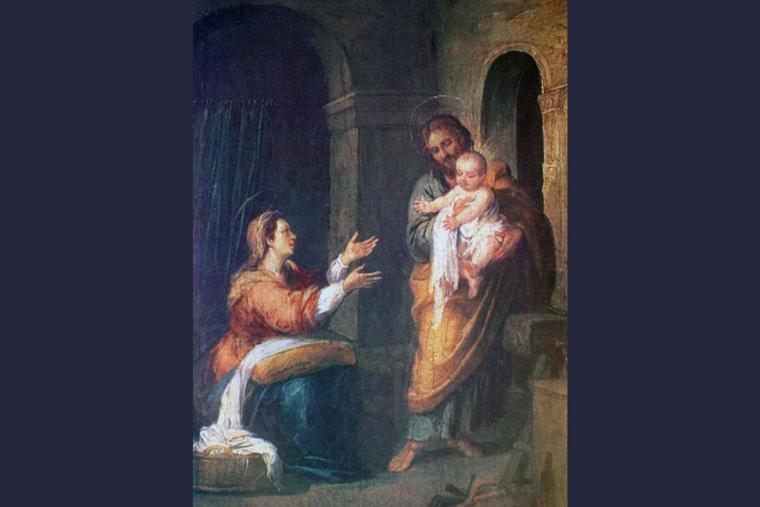Christmas and Its Forgotten Message
COMMENTARY: A special birth with a special message

It is only too common for people to view Christmas as a social experience rather than understand it as a historical event. Thus, Christmas is a time for Christmas music, Christmas parties, Christmas trees and Christmas gifts.
It is a wonderful time enriched by food, friendship, fellowship and festivities. All this is, indeed, very good, but, unfortunately, it misses the mark. Often lost in the merriment of Christmas celebrations is the historical fact that a Baby was born to a poor couple in a manger that they shared not with other human beings, but with animals. It was a special birth conveying a special message.
As Pope Benedict XVI pointed out in Jesus of Nazareth, “From the moment of his birth, he [Christ] belongs outside of what is important and powerful in worldly terms. Yet it is this unimportant and powerless child that proves to be the truly powerful one, the one on whom ultimately everything depends.”
The Christ Child was both wanted and unwanted. He was most assuredly wanted and loved by his parents. King Herod, on the other hand, set out to ensure that only he, and not the Christ Child, would be king. From the beginning, this Child would be a sign of contradiction.
The Annunciation was an announcement to Mary, contingent upon her consent, that she would be with child. Angel Gabriel did not speak of marriage, success or personal accomplishments. He spoke of the Child. The Annunciation anticipated the Nativity. It was the Child that was always central, a fact that contradicted the concept of the family at that time in history, when the father was the dominant figure. The importance of this Child would raise the importance of every child born thereafter. In fact, it would revolutionize the very structure of the family.
The often-forgotten message of Christmas is that the child is the center of the family and that the family is the center of the world. At Christmastime, Planned Parenthood celebrates “choice on earth.” But the “choice” for all time was made by Mary at the Annunciation, and her choice was to choose life, a life that would ultimately remind us of its sacred value and inviolability.
The new hierarchy — of the child, the mother, and the father — was to replace the old hierarchy — of the father, the mother, and the child. The humblest would reign, the mother would nurse, and the father would serve both his wife and their child. It would foreshadow the Church, in which Pope Gregory the Great would identify himself and each supreme pontiff as the “Servant of Servants.” The family would be closely knit because no one was expendable and each member would have a role that contributed to the family’s integrity. The family was to be an unbreakable unicity. In ancient Rome, the notion of paterfamilias prevailed. The expression is Latin for “father of the family” or the “owner of the family estate.” Accordingly, the oldest living male in a household, usually the father, could legally exercise autocratic authority over his extended family. The father ruled; the mother and child were ruled.
In today’s world, the woman (married or single) is regarded as a “solo entity” in order to free herself to abort her child. The father of the family has no legal status to veto his wife’s choice to abort. In this way, in today’s secular world, the woman has replaced the man’s authority, while the child’s continued existence hangs on the thread of her choice.
Concerning the revolution of the family that was inaugurated by the Nativity, G.K. Chesterton expressed the matter simply and succinctly when, in The Everlasting Man, he remarked:
“The old Trinity was of father and mother and child and is called the human family. The new is of the child and mother and father and has the name of the Holy Family. It is in no way altered except in being entirely reversed; just as the world which is transformed was not in the least different, except in being turned upside down.”
If the world could choose one thing that it regarded as acceptable, it would probably be Christmas. And yet, if it saw Christmas for what it truly is, it would quickly reject it, for Christmas is about the unbarterable importance of a Child and the willingness to suffer poverty for the kingdom of God. The world would accept the glitter of Christmas, but not its grandeur.
By reversing the order of the family, the whole world is transformed! And here is the forgotten message: By according the child centrality in the family, the whole world is changed for the better because the family’s identity has been transfigured from power to love. Of all the revolutions that man has concocted, only a revolution fueled by love will endure.
As Lucy said in C.S. Lewis’ The Chronicles of Narnia, “In our world, too, a stable once had something inside it that was bigger than the whole world.”
Christmas, therefore, is about change.
And the great and fundamental paradox is that this change has its genesis in humility, in a Child wrapped in swaddling clothes and born in a manger.
The secularization of Christmas causes us to lose sight of its essential message.
Prayerful meditation, however, can make its basic message clear and, more importantly, can revolutionize our lives.
- Keywords:
- family life
- supporting families
- baby jesus














